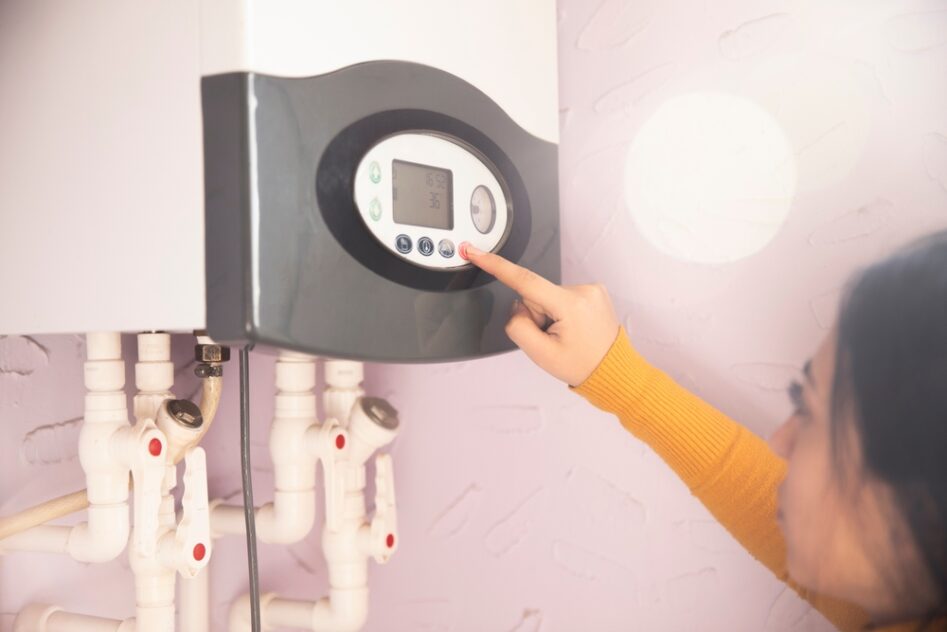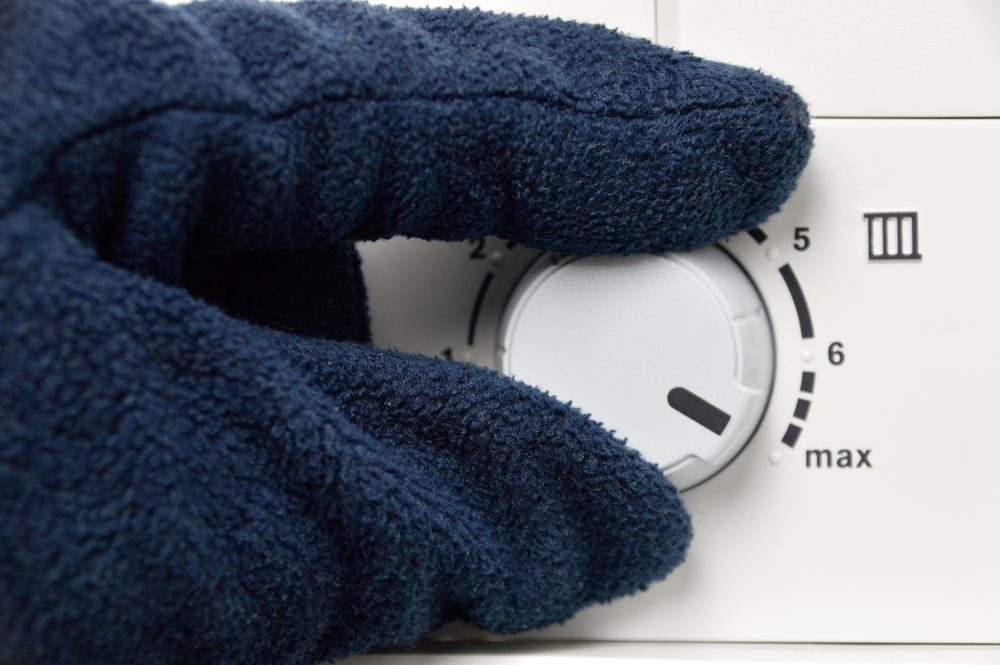Tankless Water Heater Pros and Cons

Time for a new water heater? If you live in Southern Oklahoma or North Texas, you’ve probably heard friends, family, or even your plumber rave about the benefits of a tankless water heater. And they all have a point, whether you’re dealing with growing households or rising energy costs. Can you imagine never scheduling your showers again?
With a tankless water heater, you can shower without worrying about the water running cold – even when everyone in the house is getting ready at once. Continue reading to learn the pros and cons of tankless water heaters and how Hunter Super Techs helps homeowners across Southern OK and North TX decide if going tankless makes sense for their home.
Table of Contents
What is a Tankless Water Heater?
Also known as an on-demand or instant water heater, a tankless water heater only heats water when needed.
As the name suggests, a tankless water heater has no storage tank that stores and heats water. Instead, water flows through a heating element that quickly heats and disperses hot water to the respective faucets.
Types of Tankless Water Heaters
There are various tankless water heaters on the market, categorized by fuel type and whether they serve whole-home needs.
Gas
Gas tankless water heaters burn propane or natural gas to heat water. Gas-fueled water heaters come in condensing and non-condensing options.
Condensing
Condensing gas water heaters have a secondary heat exchanger that uses heat from the exhaust to warm the water before it reaches the main heat exchanger. This eliminates the need for a stainless steel exhaust system.
Non-condensing
Non-condensing gas water heaters don’t have a secondary heat exchanger. This tankless water heater uses a primary heat exchanger to heat and disperse water rapidly.
Since they don’t have a secondary heat exchanger, the exhaust must be vented through a stainless steel exhaust system.
Electric
Electric tankless water heaters rely on an electric heating element to heat water rapidly. They are often easier to install in Southern Oklahoma and North Texas homes that don’t already have natural gas lines. While installation costs may be lower, some homes may require electrical panel upgrades to handle the added demand.
Point-of-Use
Point-of-use tankless water heaters are ideal for smaller households.
Unlike traditional tankless systems that heat water for the entire house, these heaters are installed next to a specific shower, faucet, or appliance to provide hot water exactly where it’s needed.
Pros of Tankless Water Heaters
Tankless water heaters are becoming increasingly popular because of their efficiency and convenience. Some of the top tankless water heater benefits include:
Improved Energy Efficiency
A tankless water heater uses far less fuel and electricity than its storage tank counterpart. By reducing energy costs, you can save over time.
Instant Hot Water Supply
The hallmark of a tankless water heater is its ability to heat water on demand. This means that you can get instant hot water whenever you need it.
Saves Space in Your Home
Tankless water heaters are small and can be placed in locations like closets or utility rooms—perfect for smaller homes with limited space.
Never-Ending Hot Water
A tankless water heater provides a never-ending supply of hot water, which means you won’t have to worry about your shower running cold.
Longer Lifespan
Tankless water heaters can last up to 20 years, while traditional tank-style water heaters typically last about 12 years.
Lower Utility Bills
Tankless water heaters use less energy than storage-tank water heaters, which can help you save on your monthly utility bills.
Cons of Tankless Water Heaters
Nothing is ever 100% perfect. If you’re concerned about high upfront costs and household size, a tankless water heater might not be for you.
Here are some tankless water heater cons:
Higher Initial Costs
The upfront cost of a tankless water heater is higher than that of a storage-tank water heater. Although the long-term savings can be significant, the high upfront cost may deter budget-conscious buyers.
Multiple Units for Larger Households
Tankless water heaters struggle to provide hot water to multiple appliances, showers, and fixtures simultaneously. Installing several units can get pricey, which may not be practical for larger households.
Limited Flow Rates
A tankless water heater typically requires a higher gas flow rate or greater electrical capacity. Upgrading the flow rate may increase water heater installation costs.
Regional Factors That Affect Tankless Water Heaters in Southern Oklahoma & North Texas
While tankless water heaters offer great benefits, local climate, water quality, and home infrastructure play a major role in whether they’re the right choice for homeowners in Southern Oklahoma and North Texas.
Hard Water Conditions
Much of Southern Oklahoma and North Texas has moderately to very hard water. Mineral buildup from hard water can reduce efficiency and shorten the lifespan of tankless water heaters if they aren’t properly maintained. Regular descaling is especially important in this region to prevent calcium and lime buildup inside the heat exchanger.
High Hot Water Demand During Summer
Long, hot summers mean more frequent showers, laundry loads, and dishwashing – especially in larger households. Tankless water heaters are well-suited for this increased demand because they don’t rely on stored hot water that can run out during peak usage times.
Gas Availability vs. Electrical Capacity
Many North Texas homes have access to natural gas, making gas tankless water heaters a popular and efficient option. In rural parts of Southern Oklahoma, propane or electric units may be more common. However, electric tankless systems often require electrical upgrades to meet power demands, which can impact total installation cost.
Older Homes & Plumbing Layouts
Older homes throughout the region may need plumbing, venting, or gas line upgrades before installing a tankless water heater. A professional evaluation ensures the system is sized correctly and complies with local building codes common to Oklahoma and Texas municipalities.
How Much Do Tankless Water Heaters Cost?
The average cost of a tankless water heater ranges between $800 and $3,500.
It’s understandable that some may find the initial cost of a tankless water heater off-putting. In fact, it can cost three times as much to purchase and install a tankless water heater compared to a traditional storage-tank water heater.
However, the long-term savings can significantly outweigh the initial cost.

Installing and Maintaining a Tankless Water Heater
Installation
Choosing a reputable local company for tankless water heater installation ensures proper setup. Factors like fuel type availability, regional climate, local plumbing codes, and water quality in Southern Oklahoma and North Texas must all be taken into consideration. Checking local reviews and working with technicians familiar with area-specific requirements can make all the difference.
Maintenance
The best way to get the most out of your tankless water heater is to maintain it regularly. Hunter Super Techs can help maintain your tankless water heater by descaling, addressing the flow sensor, and making minor repairs to ensure everything flows smoothly.
Let’s Install Your Tankless Water Heater
If it’s time for a water heater upgrade, it’s time to consider going tankless.
Hunter Super Techs proudly installs and maintains tankless water heaters for homeowners throughout Southern Oklahoma and North Texas. Whether you’re dealing with hard water, upgrading an older home, or simply want endless hot water, our team understands the local conditions that impact your system. Get 24/7 support from on-demand plumbers in your area and say goodbye to cold showers for good.
FAQs
Can a tankless water heater be installed in any home?
Yes. Tankless water heaters are especially popular for homes with limited space. However, you might need to upgrade your fuel or energy source to accommodate one.
Are tankless water heaters more energy efficient?
Tankless water heaters use less energy than traditional storage-tank water heaters, making them a more energy-efficient option.
What are the main differences between gas and electric tankless water heaters?
Gas tankless water heaters use natural gas or propane, which requires venting. Electric tankless water heaters do not require venting since they run on electricity. Electric tankless water heaters are also easier to install than gas tankless water heaters.
